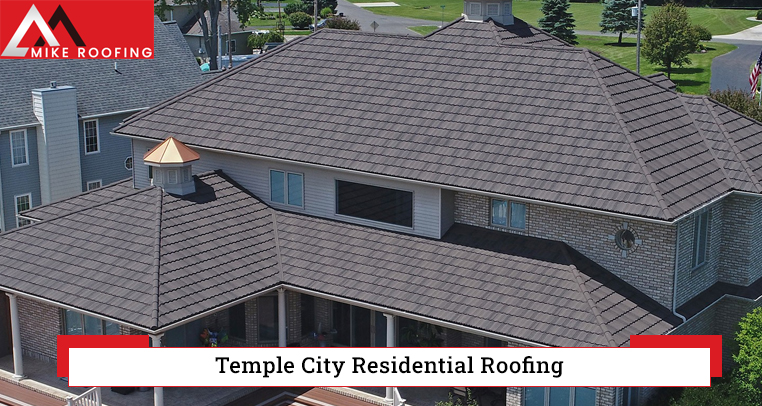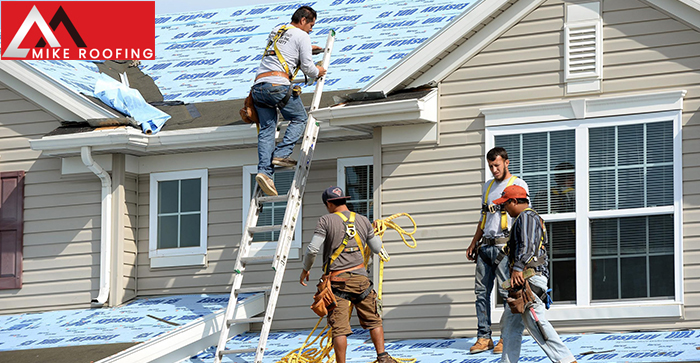When you are planning for the Temple City Residential Roofing project, it is important to consider the climate. Here are some of the ways in which climate can influence the roofing decision.

The hot climate of Temple City requires roofing materials that can withstand prolonged exposure to intense heat. Homeowners often choose materials with high heat reflectivity and thermal resistance to keep their homes cooler and reduce energy consumption.
With abundant sunshine throughout the year, UV radiation becomes a consideration. Roofing materials with UV-resistant properties help prevent color fading, deterioration, and premature aging caused by prolonged sun exposure.
Temple City experiences periods of heavy rainfall. Homeowners need roofing systems that effectively channel and drain water to prevent leaks, water damage, and structural issues. Durable and waterproof materials, along with proper installation techniques, are crucial to withstand these rainfall events.
Temple City can experience strong winds, especially during seasonal changes and occasional storms. It is important to choose roofing materials that are wind-resistant and properly installed to withstand these gusts and prevent wind uplift or damage to the roof.
Located in a seismically active area, Temple City’s roofing decisions may need to account for earthquake resistance. Roofing materials and installation techniques should be chosen to ensure structural integrity and minimize the risk of damage during seismic events.
Here are some of the options that you can try out for Temple City residential roofing project
Affordable, widely available, and easy to install.
Durable, fire-resistant, and offer a unique aesthetic appeal
Long-lasting, lightweight, and energy-efficient.
Provides excellent protection against water and moisture
Traditional option that offers good protection at a lower cost.
Offers enhanced durability and added waterproofing capabilities
Facilitate continuous airflow along the roof’s ridge, improving ventilation.
Installed in the eaves to draw in cool air and improve airflow
Use wind power to drive ventilation and promote air circulation.
Durable, weather-resistant, and effectively seals roof joints and transitions.
Resistant to moisture and corrosion, ideal for areas prone to water infiltration.
Flexible and provides a secure seal around irregular roof features.
Lightweight, cost-effective, and resistant to rust and corrosion
Durable, aesthetically pleasing, and offer excellent longevity.
Low-maintenance, affordable, and easy to install.
There are different stages in the life of your roof and at each stage, it needs different services. Mike Roofing offers comprehensive services that take care of all your requirements for Temple City residential roofing
| Stage | Services Required |
|---|---|
| Installation |
|
| Maintenance |
|
| Repair |
|
| Replacement |
|
The specific permits required for Temple City residential roofing may vary based on local regulations and the scope of the project. However, here are some common permits that may be required

A building permit is typically required for any major roofing project, such as roof replacement or significant repairs. It ensures that the work complies with local building codes and regulations.
Some jurisdictions may have specific permits dedicated to roofing projects. This permit focuses on the roof-related aspects of the construction, including materials, installation methods, and safety measures.
If the roofing project involves electrical work, such as installing or repairing roof-mounted solar panels or related wiring, an electrical permit may be necessary. This ensures that the electrical work is performed safely and meets the applicable electrical codes.
For larger roofing projects that generate a significant amount of waste, a permit may be required to place a dumpster or waste container on the property. This ensures proper waste management and disposal.
Here is the process of applying for a roofing permit in Temple City. Get in touch with us and we would help you at each of the following stages
Gather the required documentation, which may include completed permit application forms, detailed roofing plans, specifications, product information, contractor information, and any other supporting documents requested by the building department
Once you have prepared the necessary documentation, submit your permit application to the local building department. This is typically done in person at the building department office, although some jurisdictions may offer online submission options.
Pay the applicable permit fees, which can vary based on the scope and value of the roofing project. The building department will provide information on the payment methods accepted.
The building department will review your permit application and accompanying documents to ensure compliance with local building codes, zoning regulations, and safety standards. This review process may take a few days to several weeks, depending on the workload of the department.
Once your application is approved, the building department will issue the roofing permit. Ensure that you receive the permit documentation, including any approved plans or specifications.
As you proceed with the roofing project, you will need to schedule inspections at various stages, such as before starting the work, during specific installation phases, and upon completion. Contact the building department to schedule inspections and ensure compliance with building codes.
Options to improve energy efficiency include choosing energy-efficient roofing materials, such as cool roofs or reflective coatings, ensuring proper insulation and ventilation, and considering the installation of solar panels.
The decision to repair or replace a roof depends on the extent of the damage, the age of the roof, and its overall condition. In some cases, a minor leak can be repaired, but if the roof is older or has multiple issues, replacement might be more cost-effective in the long run.
The lifespan of a residential roof depends on various factors such as the roofing material, installation quality, climate, and maintenance. Generally, asphalt shingle roofs last around 20-25 years, while metal roofs can last 40 years or more.